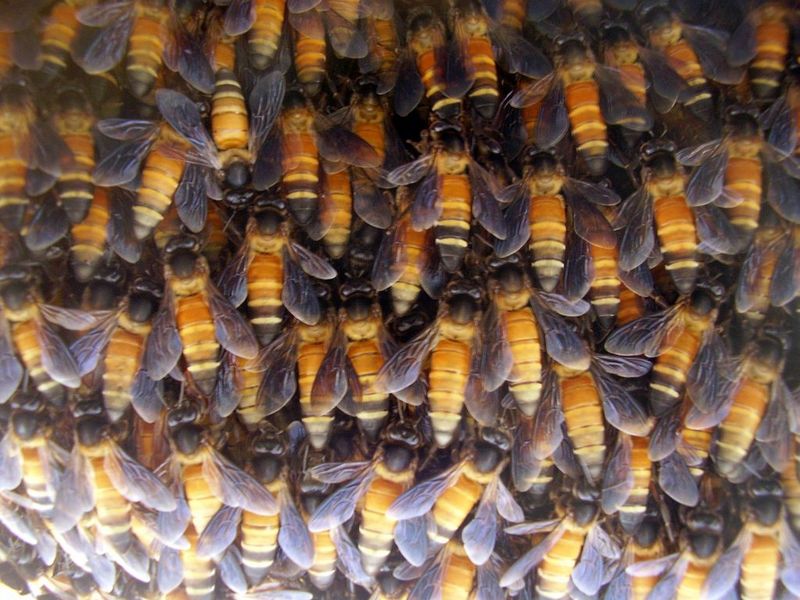|
Giant Honey Bee (Apis dorsata) - Wiki
| 제목: | Giant Honey Bee (Apis dorsata) - Wiki
| |

| 해상도: 1024x768
파일크기: 157522 Bytes
촬영일: 2006:10:21 12:34:43
사진기: FE115,X715 (OLYMPUS IMAGING CORP. )
F number: f/3.0
Exposure: 1/2 sec
Focal Length: 620/100
등록시간: 2007:10:09 10:49:46
|
Apis dorsata
From Wikipedia, the free encyclopedia
[Photo] Giant Honey Bee (Apis dorsata). Close-up of workers on comb. "A hive of Apis Dorsata (giant honey bees) I photographed whilst in Mt Abu, India. This hive was situated right next to a glass window of a building enabling me to get close enough." Date 21 October 2006. Photo by http://en.wikipedia.org/wiki/User:Bksimonb | Permission is granted to copy, distribute and/or modify this document under the terms of the GNU Free Documentation License, Version 1.2 or any later version published by the Free Software Foundation; with no Invariant Sections, no Front-Cover Texts, and no Back-Cover Texts. A copy of the license is included in the section entitled "GNU Free Documentation License". |
Apis dorsata, the Giant honey bee, is a honey bee of southern and southeastern Asia. It is only slightly smaller than the Himalayan honey bee.
In the wild, they prefer to nest in exposed areas far off the ground, on tree limbs and under cliff overhangs, and sometimes on buildings. They are aggressive bees which have never been domesticated (as they do not use enclosed cavities for nesting), and can be extremely dangerous if the colony is provoked. Each colony consists of a single vertical comb (sometimes approaching a square meter) suspended from above, and the comb is typically covered by a dense mass of bees. When approached, the workers may exhibit a warning posture, and this signal is transmitted to nearby workers that also adopt the posture, thus creating a visible (and audible) "ripple" effect across the face of the comb, in an almost identical manner to an audience wave at a crowded stadium.
Despite its aggressive nature, indigenous peoples have used this species as a source of honey and beeswax, a practice known as "honey hunting."
Subspecies
Engel (1999) recognized the following subspecies:
Apis dorsata dorsata; primarily from India
Apis dorsata binghami Cockerell; (Indonesian honey bee) from Malaysia and Indonesia
Apis dorsata breviligula Maa; from the Philippines
Apis dorsata laboriosa Fabricius; (Himalayan honey bee), also in Myanmar, Laos, and southern China.
The latter is not distinct morphologically from the nominate, but has different housekeeping and swarming behavior, allowing it to survive at high altitudes. In addition, there has been little gene flow between it and A. dorsata for millions of years; accordingly, some (Arias & Sheppard 2005) argue that it should be classified as a species. Likewise, the southeastern taxon binghami seems also to be distinct. The limits of their ranges in Indochina and the possible distinctness of the geographically distant Philippines population require more study (Arias & Sheppard 2005). However, the use of the taxonomic rank of "subspecies" is typical for geographically discrete populations, so the difference in opinion here is whether or not to recognize the rank of subspecies or not (i.e., no one is disputing that they are distinct lineages, the dispute is over whether to call them "species").
http://en.wikipedia.org/wiki/Apis_dorsata
| The text in this page is based on the copyrighted Wikipedia article shown in above URL. It is used under the GNU Free Documentation License. You may redistribute it, verbatim or modified, providing that you comply with the terms of the GFDL. |
|
댓글 |
|---|
| | cialis kaufen |
|
| xItWLH ppqzdqgh fxljbayj dvbifriw |
| | cialis compra |
|
| epavhuyy yzaefstk eqmtlypu |
| | cialis |
|
| xnviidyx mqslbuth ttviatnv |
| | acquista cialis |
|
| shldypui cyneqyna ikzwlcbn |
| | cialis |
|
| kwxpszqn okstposi lwvtrtlb |
| | generique cialis |
|
| evqzumwk ywindwgp jqllyyrv |
| | GOPIKANTA GHOSH |
|
| I MUST KNOW MORE...I PROMOTE BEEKEEPING AND BEEHUNTING |
| | Pharmb154 |
|
| Hello! caadeda interesting caadeda site! |
| | Pharmd238 |
|
| Very nice site! |
^o^
동물그림창고 똑똑전화 누리집
^o^
|
|
|

